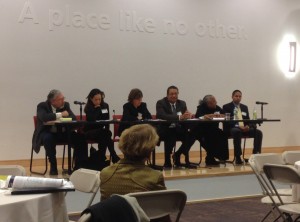At the luncheon for the One Nation Indivisible school integration conference, “Where Integration Meets Innovation”, a panel of speakers explained the massive strides that have been taken towards educational equality in Hartford as a result of the Sheff v. O’Neill lawsuit. Panel members also spoke about how although decades progress have been made, the Sheff team, along with the city of Hartford, still has a lot of work ahead of them. A particular member of the panel who spoke of these conflicting emotions was Dennis Parker, who has been an attorney for the Sheff plaintiffs for nineteen years.
Parker explained that his team is in the midst of making very stressful, and confidential, negotiations for the case. He remarked on how during taxing times of case, he finds it important to reflect on “what Sheff means.” To do this, Parker brought the audience back to 1989 when the lawsuit was just beginning. He explained the major wealth disparities that existed in Connecticut at the time. Connecticut, the wealthiest state, with some of the most prestigious suburbs and schools in the nation, was also home to three of the nations poorest regions: Hartford, Bridgeport, and New Haven. One of the major issues with such imbalance, Parker said, was that the school systems in those these areas reflected the poverty of the regions. Students in the thriving suburbs benefited from rounded educations, and were given opportunities that students in Hartford, New Haven, and Bridgeport would not receive.
Since then, major progress has been made. Not only has magnet school enrollment increased, but the quality of such magnet schools are better than some may have imagined. Parker said, “Now everyone in the region has the opportunity to go to incredible magnet schools.” The Sheff team is closer than ever to fulfilling their goal of 41% of Hartford students being enrolled in desegregated schools.
Parker recognized that even once Sheff reaches its goal, there will still be many students in segregated settings. He agreed with another member of the panel, Martha Stone, and who said, “we are only looking at, at best, a glass half full.” However, Parker believes that it is more important to look at how far the Sheff team has come since the great disparities of 1989. He agrees that the case is stressful, and there is still much work to be done, but when we reflect on where the process began, we remember how much progress the team has made. Parker concluded by stating that he hopes the Sheff team’s work benefits not only students in Hartford, but students in surrounding districts as well.
